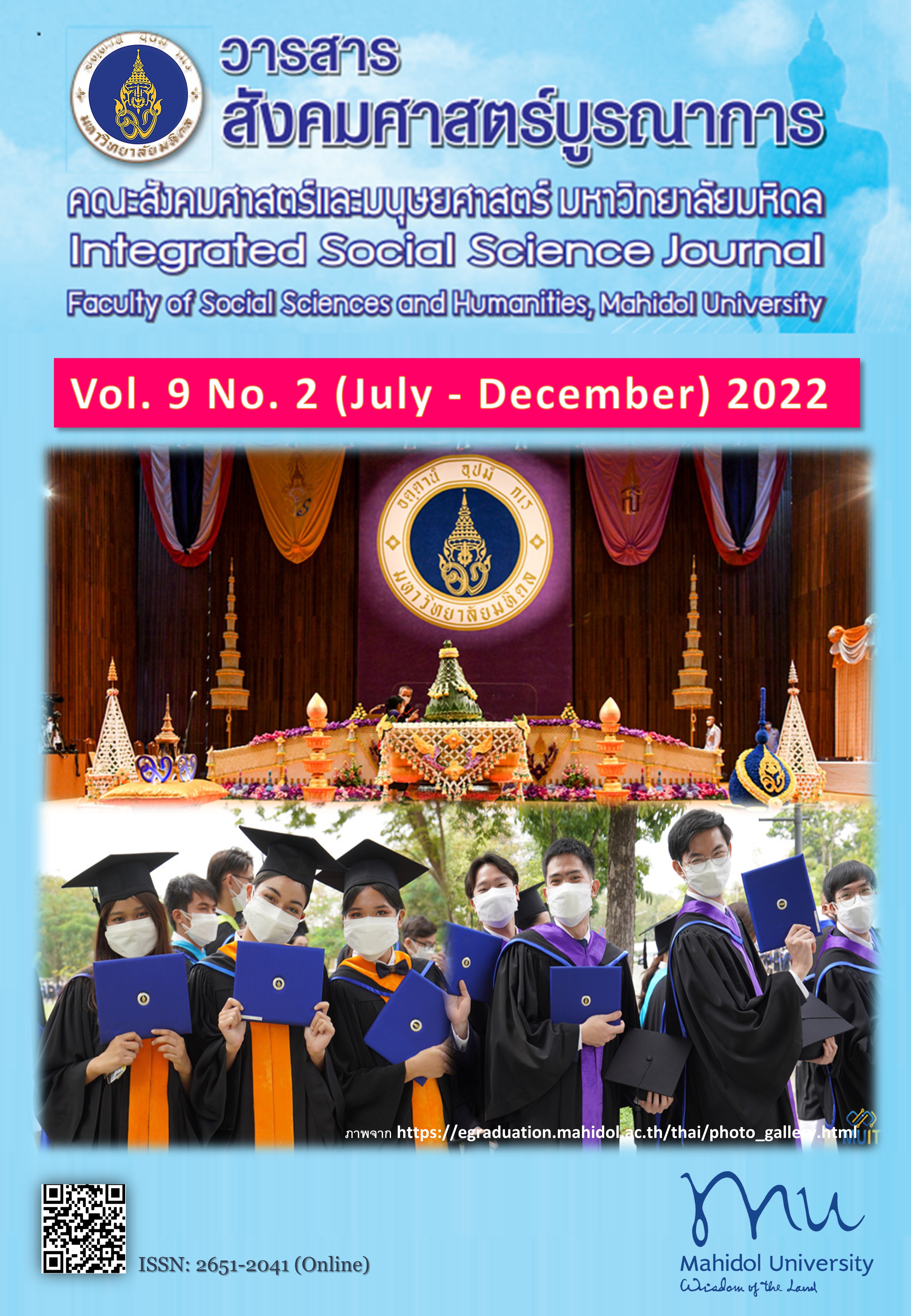ปัจจัยที่ส่งผลต่อพฤติกรรมในการป้องกันตนเองจากการติดเชื้อไวรัสโควิด-19 ของประชาชนในเขตเทศบาลนครอุบลราชธานี จังหวัดอุบลราชธานี
Main Article Content
บทคัดย่อ
จากการระบาดของไวรัสโควิด-19 ตั้งแต่ปี พ.ศ. 2563 เป็นต้นมา ได้ส่งผลกระทบต่อการใช้ชีวิตประจำวันของประชาชน ทั้งปัญหาด้านเศรษฐกิจ สังคม การถูกเลิกจ้างทำให้ขาดรายได้ ต้องมีการรักษาระยะห่างทางสังคม ความสัมพันธ์ระหว่างคนในครอบครัวและชุมชนลดลง เกิดวิถีชีวิตใหม่ (New Normal) จึงมีความจำเป็นที่ประชาชนจะต้องมีความรู้ และพฤติกรรมการป้องกันตนเองอย่างเหมาะสมเพื่อป้องกันการติดเชื้อดังกล่าว การวิจัยนี้มีวัตถุประสงค์เพื่อศึกษาระดับความรู้ ทัศนคติ และพฤติกรรมป้องกันตนเองจากการติดเชื้อไวรัสโควิด-19 และศึกษาปัจจัยที่มีอิทธิพลต่อพฤติกรรมการป้องกันตนเองจากการติดเชื้อไวรัสโควิด-19 กลุ่มตัวอย่าง คือ ประชาชนที่อาศัยและมีภูมิลำเนาในเขตเทศบาลนครอุบลราชธานี จังหวัดอุบลราชธานี จำนวน 400 คน คัดเลือกโดยใช้การสุ่มแบบแบ่งชั้นภูมิ เครื่องมือในการวิจัย ได้แก่ แบบสอบถามเกี่ยวกับปัจจัยส่วนบุคคล ความรู้เกี่ยวกับเชื้อไวรัสโควิด-19 ทัศนคติที่มีต่อเชื้อไวรัสโควิด-19 และพฤติกรรมการปฏิบัติตนในการป้องกันตนเองจากการติดเเชื้อไวรัสโควิด-19 สถิติที่ใช้วิเคราะห์ข้อมูลประกอบด้วย สถิติเชิงพรรณนา ได้แก่ ร้อยละ ค่าเฉลี่ย ส่วนเบี่ยงเบนมาตรฐาน และสถิติเชิงอนุมาน ได้แก่ การเปรียบเทียบความแตกต่างของค่าเฉลี่ยระหว่างสองตัวแปรที่เป็นอิสระต่อกัน การวิเคราะห์ความแปรปรวนทางเดียว และการวิเคราะห์ความแตกต่างรายคู่โดยวิธี Scheffe Post Hoc Test และการหาค่าสัมประสิทธิ์สหสัมพันธ์ของเพียร์สัน ผลการวิจัย พบว่า กลุ่มตัวอย่างประชาชนส่วนใหญ่มีความรู้ ทัศนคติ และมีพฤติกรรมการปฏิบัติตนในการป้องกันโรคที่เกิดจากเชื้อไวรัสโควิด-19 ในระดับสูง ที่สำคัญ การวิจัยนี้พบว่า เพศหญิงมีพฤติกรรมในการป้องกันตนเองสูงกว่าเพศชาย และกลุ่มข้าราชการ รัฐวิสาหกิจ ค้าขาย เกษตรกร และนักศึกษา มีพฤติกรรมในการป้องกันตนเองสูงกว่าผู้ประกอบอาชีพรับจ้าง ในตอนท้าย ผลการวิจัยพบว่า พฤติกรรมในการป้องกันตนเองจากเชื้อไวรัสโควิด-19 มีความสัมพันธ์เชิงบวกกับทัศนคติของประชาชนที่มีต่อโรค ผู้วิจัยยังได้จัดทำข้อเสนอแนะต่อหน่วยงานต่าง ๆ ในจังหวัดอุบลราชธานี เพื่อพัฒนาแนวทางในการดำเนินงานป้องกันและควบคุมการแพร่ระบาดของเชื้อไวรัสโควิด-19 ให้มีประสิทธิภาพและประสิทธิผลมากขึ้น
Article Details

อนุญาตภายใต้เงื่อนไข Creative Commons Attribution-NonCommercial-NoDerivatives 4.0 International License.
- วารสารสังคมศาสตร์บูรณาการ มหาวิทยาลัยมหิดล อนุญาตให้สามารถนำไฟล์บทความไปใช้ประโยชน์และเผยแพร่ต่อได้ โดยอยู่ภายใต้เงื่อนไขสัญญาอนุญาต CC Attribution-NonCommercial-NoDerivatives 4.0 International (CC BY-NC-ND 4.0) โดยต้องแสดงที่มา/การอ้างอิงจากวารสาร – ไม่ใช้เพื่อการค้า – ห้ามแก้ไขดัดแปลงเนื้อหา
- ข้อความที่ปรากฏในบทความในวารสารฯ เป็นความคิดเห็นส่วนตัวของผู้เขียนแต่ละท่าน ไม่เกี่ยวข้องกับกองบรรณาธิการวารสารฯ (ซึ่งหมายรวมถึง บรรณาธิการ ผู้ทรงคุณวุฒิในกองบรรณาธิการ หรือ บรรณาธิการรับเชิญ) แต่อย่างใด ความรับผิดชอบองค์ประกอบทั้งหมดของบทความแต่ละเรื่องเป็นของผู้เขียนแต่ละท่าน หากมีความผิดพลาดใด ๆ ผู้เขียนแต่ละท่านจะรับผิดชอบบทความของตนเอง ตลอดจนความรับผิดชอบด้านเนื้อหาและการตรวจร่างบทความเป็นของผู้เขียน ไม่เกี่ยวข้องกับกองบรรณาธิการวารสารฯ
- กองบรรณาธิการขอสงวนสิทธิ์ในการตัดทอน/ปรับแก้ถ้อยคำบางประการเพื่อความเหมาะสม
เอกสารอ้างอิง
กรมควบคุมโรค กระทรวงสาธารณสุข. (2564). สถานการณ์ผู้ติดเชื้อโคโรนา 2019. https://ddcportal.ddc.moph.go.th/portal/apps/opsdashboard/index.html#/20f3466e075e45e5946aa87c96e8ad65.
เทศบาลนครอุบลราชธานี. (2564). จำนวนประชากรชาย/หญิง ปี 2563. http://www.cityub.go.th/New2017/index.php/2016-12-14-08-29-54/3081.
บุศณี มุจรินทร์, ประเสริฐ ประสมรักษ์ และสำราญ เหล็กงาม. (2563). พฤติกรรมการป้องกันตนเอง ความเครียดและการเผชิญความเครียดในภาวะวิกฤติด้านสุขภาพจากการแพร่ระบาดชองโรคติดต่อเชื้อไวรัสโคโรนา (COVID-19) ในจังหวัดอำนาจเจริญ. วารสารการพัฒนาสุขภาพชุมชน มหาวิทยาลัยขอนแก่น, 8(6), 413-424.
ยง ภู่วรวรรณ. (2563). ผลกระทบจากการระบาดของโรคโควิด 19. https://learningcovid.ku.ac.th/course/?c=7&l=2.
รัฐบาลไทย. (2564). ศูนย์บริหารสถานการณ์แพร่ระบาดของโรคติดเชื้อไวรัสโคโรนา 2019. https://www.moicovid.com.
วรรณวิมล เมฆวิมล. (2553). พฤติกรรมการดูแลสุขภาพของประชาชนในพื้นที่ฝึกปฏิบัติงานของนักศึกษาสาขาวิชาการแพทย์แผนไทยประยุกต์ คณะวิทยาศาสตร์และเทคโนโลยี มหาวิทยาลัยราชภัฏสวนสุนันทา. คณะวิทยาศาสตร์และเทคโนโลยี มหาวิทยาลัยราชภัฏสวนสุนันทา.
Al-Hanawi, M. K., Angawi, K., Alshareef, N., Qattan, A. M., Helmy, H. Z., Abudawood, Y., ... & Alsharqi, O. (2020). Knowledge, attitude, and practice toward COVID-19 among the public in the Kingdom of Saudi Arabia: A cross-sectional study. Frontiers in Public Health, 8, 217.
Alhazmi, A., Ali, M. H., Mohieldin, A., Aziz, F., Osman, O. B., & Ahmed, W. A. (2020). Knowledge, attitudes and practices among people in Saudi Arabia regarding COVID-19: A cross-sectional study. J Public Health Res, 9(3), 345-353.
Azlan, A. A., Hamzah, M. R., Sern, T. J., Ayub, S. H., & Mohamad, E. (2020). Knowledge, attitudes and practices towards COVID-19: A cross-sectional study in Malaysia. Plos One, 15(5), e0233668.
Becker, M. H. (1974). The health belief model and personal health behavior. Slack Thorofare.
Bloom, B. S. (1964). Taxonom.y of education objective: The classification of educational goals: Handbook II: Affective domain. David Mckay.
Bloom, B. S., Madaus, G. F., & Hastings, J. T. (1971). Handbook on formative and summative evaluation of student learning. McGraw-Hill.
Harris, D. M., & Guten, S. (1979). Health protective behavior: An exploratory study. Journal of Health and Social Behavior, 1(3), 10-20.
Hussein, N. R., Naqid, I. A., Jacksi, K., & Abdi, B. A. (2020). Assessment of knowledge, attitudes, and practices toward COVID-19 virus among university students in Kurdistan region, Iraq: Online cross-sectional study. Journal of Family Medicine and Primary Care, 9(9), 4809–4814.
Li, S., Feng, B., Liao, W., & Pan, W. (2020). Internet use, risk awareness, and demographic characteristics associated with engagement in preventive behaviors and testing: Cross-sectional survey on COVID-19 in the United States. J Med Internet Res, 22(6), e19782.
Nunnally, J. C. (1978). Psychometric theory (2nd ed.). McGraw-Hill.
Reuben, R. C., Danladi, M. M., Saleh, D. A., & Ejembi, P. E. (2020). Knowledge, attitudes and practices towards COVID-19: An epidemiological survey in North-Central Nigeria. J Community Health, 7, 1-14.
Rovinelli, R. J., & Hambleton, R. K. (1977). On the use of content specialists in the assessment of criterion-referenced test item validity. Tijdschrift voor Onderwijsresearch, 2(2), 49–60
Steele, J. L., & McBroom, W. H. (1972). Conceptual and empirical dimensions of health behavior. Journal of Health and Social Behavior, 13(4), 382 - 392.
Taro, Y. (1973). Statistics: An introductory analysis. Harper and Row Publications.
Zhang, M., Zhou, M., Tang, F., Wang, Y., Nie, H., Zhang. L., & You G. (2020). Knowledge, attitude, and practice regarding COVID-19 among healthcare workers in Henan, China. J Hosp Infect, 105(2), 183-187.
Zhong, B. L., Luo, W., Li, H. M., Zhang, Q. Q., Liu, X. G., Li, W. T., & Yi, L. (2020). Knowledge, attitudes, and practices towards COVID-19 among Chinese residents during the rapid rise period of the COVID-19 outbreak: A quick online cross-sectional survey. Int J Biol Sci, 16(10), 1745-1752.


